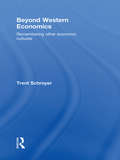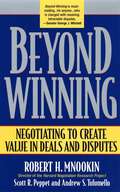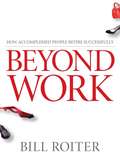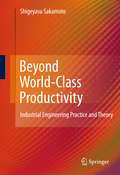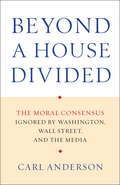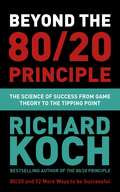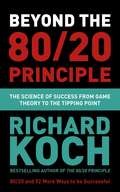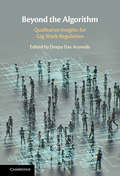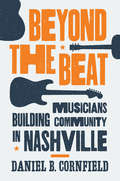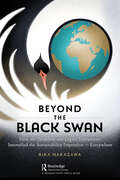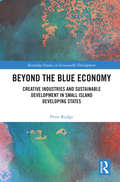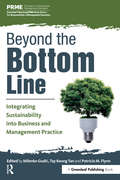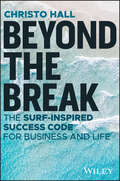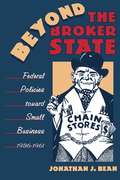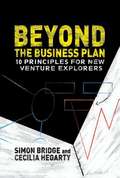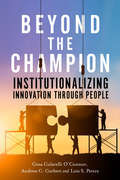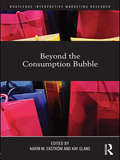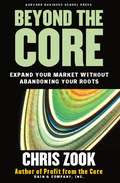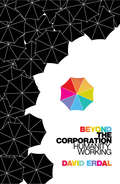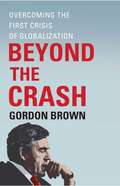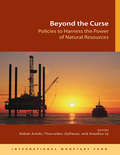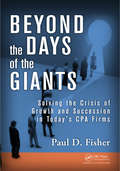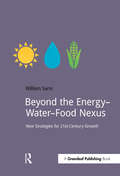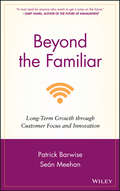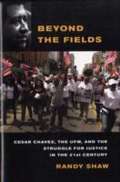- Table View
- List View
Beyond Western Economics: Remembering Other Economic Cultures
by Trent SchroyerThis book combines intellectual history with contemporary events to offer a critique of mainstream economic thought and its neoliberal policy incarnation in global capitalism. The critique operates both theoretically, at the level of metaphysics and the philosophy of science, and concretely, in case studies of globalization and world events. Trent Schroyer provides a moral and cultural interpretation of modernity and scientism, highlighting their political and economic consequences – but the book’s main purpose is not to criticize. The author moves beyond this to offer alternative "economic cultures," again combining abstract theoretical analysis with concrete case studies of alternative economic formations from local self-sufficiency movements to cooperatives and other anti-capitalist institutional experiments. These case studies exhibit an impressive range of variation, from first world to third world, from reformist to utopian transformative. Finally, Schroyer links the project to the global justice movement that opposes corporate globalization and eventually links participatory economics and democratic politics to a new image of science as "participatory social learning."
Beyond Winning
by Robert H. Mnookin Scott R. Peppet Andrew S. TulumelloConflict is inevitable, in both deals and disputes. Yet when clients call in the lawyers to haggle over who gets how much of the pie, traditional hard-bargaining tactics can lead to ruin. Too often, deals blow up, cases donâe(tm)t settle, relationships fall apart, justice is delayed. Beyond Winning charts a way out of our current crisis of confidence in the legal system. It offers a fresh look at negotiation, aimed at helping lawyers turn disputes into deals, and deals into better deals, through practical, tough-minded problem-solving techniques. In this step-by-step guide to conflict resolution, the authors describe the many obstacles that can derail a legal negotiation, both behind the bargaining table with oneâe(tm)s own client and across the table with the other side. They offer clear, candid advice about ways lawyers can search for beneficial trades, enlarge the scope of interests, improve communication, minimize transaction costs, and leave both sides better off than before. But lawyers cannot do the job alone. People who hire lawyers must help change the game from conflict to collaboration. The entrepreneur structuring a joint venture, the plaintiff embroiled in a civil suit, the CEO negotiating an employment contract, the real estate developer concerned with environmental hazards, the parent considering a custody battleâe"clients who understand the pressures and incentives a lawyer faces can work more effectively within the legal system to promote their own best interests. Attorneys exhausted by the trench warfare of cases that drag on for years will find here a positive, proven approach to revitalizing their profession.
Beyond Work: How Accomplished People Retire Successfully
by Bill RoiterSilences the worry financially successful people have over retirement while offering them exciting new ways to think about and plan for a life after work Moving beyond the world of work can be an anxious, fearful time for accomplished professionals fraught with uncertainty and indecision. Do I have enough money to live the life I want? Will I be healthy and able to manage any health problems that arise so that I can live the life I want? Will I be lonely? What kind of life do I want to live? These are the pressing questions they ask themselves and seek answers for. Yet most books on retirement focus mainly on the financial aspects of life after work, offering little of value to those who are financially secure. Beyond Work was written for accomplished people who feel financially secure enough to retire, but who are at a loss when it comes to planning their futures. It gives them the tools to think about all the other important aspects of retirement, so they can make a successful transition to and find meaning and satisfaction in retirement. Explores the four challenges that must be met in order to have a fulfilling retirement: financial, physical, social, and personal Packed with inspiring and instructive real-life retirement stories and practical tools that assist readers in making the transition to life after work
Beyond World-Class Productivity: Industrial Engineering Practice and Theory
by Shigeyasu SakamotoFrom the automotive industry to the semiconductor industry, manufacturers are suffering from an overabundance of automation methods that they cannot fully comprehend or afford, and glamorous leadership techniques that are simply not sustainable. In this respect, management has lost its way. Beyond World-Class Productivity shows why a return to traditional tools and the power of people can help companies meet today's challenges in the manufacturing sector. Beyond World-Class Productivity gives readers a balance of essential information, theory and case studies. Readers can expect to gain new insights into engineering approaches to productivity, profitability and real or non-real gain, including: * useful tools for industrial engineering * effectiveness in unit labor costs; * feasibility studies * work simplification; and * developing mind innovation. Practical examples and their accompanying commentary come from the author's 40 years of real-world experience on the shop floor and in the boardroom. Figures are also provided to illustrate actual productivity results from real companies. Both managers and engineers can appreciate Beyond World-Class Productivity as an enlightening guide to the improvement of productivity and profitability within the manufacturing sector.
Beyond a House Divided: The Moral Consensus Ignored by Washington, Wall Street, and the Media
by Carl AndersonFor those who see America as a country at war with itself, divided red against blue, us against them, Carl Anderson explores what many have missed: statistical data showing an overwhelming consensus on many of the country's seemingly most divisive issues.
Beyond the 80/20 Principle: The Science of Success from Game Theory to the Tipping Point
by Richard KochMillions of highly effective people around the world have read Richard Koch's global bestseller THE 80/20 PRINCIPLE and enjoyed a serious advantage in the pursuit of success. Now, BEYOND THE 80/20 PRINCIPLE (previously published as The 80/20 Principle and 92 Other Powerful Laws of Nature) takes you even further.Including the 80/20 Principle itself - the radical power law that helps you achieve more by doing less - BEYOND THE 80/20 PRINCIPLE reveals 92 more universal scientific principles and laws that will help you achieve personal success in an increasingly challenging business environment.From natural selection to genes and memes, BEYOND THE 80/20 PRINCIPLE demonstrates, in theory and in practice, what science can teach you about business and success. It includes: * Evolution by Natural Selection * Business Genes * Gause's Laws * Evolutionary Psychology * Newton's Laws * Relativity * Quantum Mechanics * Chaos * Complexity * The Tipping Point * Increasing Returns * Unintended Consequences'Richard Koch delivers some sharp cross-disciplinary comparisons and knows his onions on both sides of the business/science fence... Koch's feet are firmly on the ground' THE SUNDAY TIMES - Business Book of the Week'Cogently, entertainingly and often controversially, [Koch] draws parallels between the natural universe and the modern business world. Persevere with Koch's often elegant thought processes and you will look at your business quite differently' ENTERPRISE
Beyond the 80/20 Principle: The Science of Success from Game Theory to the Tipping Point
by Richard KochTHIS IS A REVISED EDITION OF THE 80/20 PRINCIPAL AND OTHER LAWSMillions of highly effective people around the world have read Richard Koch's global bestseller THE 80/20 PRINCIPLE and enjoyed a serious advantage in the pursuit of success. Now,BEYOND THE 80/20 PRINCIPLE takes you even further.Including the 80/20 Principle itself - the radical power law that helps you achieve more by doing less - BEYOND THE 80/20 PRINCIPLE reveals 92 more universal scientific principles and laws that will help you achieve personal success in an increasingly challenging business environment.From natural selection to genes and memes,BEYOND THE 80/20 PRINCIPLE demonstrates, in theory and in practice, what science can teach you about business and success. It includes: * Evolution by Natural Selection * Business Genes * Gause's Laws * Evolutionary Psychology * Newton's Laws * Relativity * Quantum Mechanics * Chaos * Complexity * The Tipping Point * Increasing Returns * Unintended Consequences'Richard Koch delivers some sharp cross-disciplinary comparisons and knows his onions on both sides of the business/science fence... Koch's feet are firmly on the ground' THE SUNDAY TIMES - Business Book of the Week'Cogently, entertainingly and often controversially, [Koch] draws parallels between the natural universe and the modern business world. Persevere with Koch's often elegant thought processes and you will look at your business quite differently' ENTERPRISE
Beyond the Algorithm: Qualitative Insights for Gig Work Regulation
by Deepa Das AcevedoIn Beyond the Algorithm: Qualitative Insights for Gig Work Regulation, Deepa Das Acevedo and a collection of scholars and experts show why government actors must go beyond mass surveys and data-scrubbing in order to truly understand the realities of gig work. The contributors draw on qualitative empirical research to reveal the narratives and real-life experiences that define gig work, and they connect these insights to policy debates being fought out in courts, town halls, and even in Congress itself. The book also bridges academic and non-academic worlds by drawing on the experiences of drivers, journalists, and workers' advocates who were among the first people to study gig work from the bottom up. This book is a must-read for anyone interested in gig work, the legal infrastructure surrounding it, and how that infrastructure can and must be improved.
Beyond the Beat
by Daniel B. CornfieldAt a time when the bulwarks of the music industry are collapsing, what does it mean to be a successful musician and artist? How might contemporary musicians sustain their artistic communities? Based on interviews with over seventy-five popular-music professionals in Nashville, Beyond the Beat looks at artist activists--those visionaries who create inclusive artist communities in today's individualistic and entrepreneurial art world. Using Nashville as a model, Daniel Cornfield develops a theory of artist activism--the ways that artist peers strengthen and build diverse artist communities.Cornfield discusses how genre-diversifying artist activists have arisen throughout the late twentieth-century musician migration to Nashville, a city that boasts the highest concentration of music jobs in the United States. Music City is now home to diverse recording artists--including Jack White, El Movimiento, the Black Keys, and Paramore. Cornfield identifies three types of artist activists: the artist-producer who produces and distributes his or her own and others' work while mentoring early-career artists, the social entrepreneur who maintains social spaces for artist networking, and arts trade union reformers who are revamping collective bargaining and union functions. Throughout, Cornfield examines enterprising musicians both known and less recognized. He links individual and collective actions taken by artist activists to their orientations toward success, audience, and risk and to their original inspirations for embarking on music careers.Beyond the Beat offers a new model of artistic success based on innovating creative institutions to benefit the society at large.
Beyond the Black Swan: How the Pandemic and Digital Innovations Intensified the Sustainability Imperative – Everywhere
by Rika NakazawaOf course, anyone would want to wake up from a really bad dream - especially one that seemed like it may never end, while successively stripping away joys and conveniences of our modern living. The COVID-19 pandemic bestowed on us a collective nightmare experience of varying intensity, akin to a "Black Swan" event, as author and mathematical philosopher Nassim Taleb might describe—given its universal rarity and devastating effects and seeming predictability in hindsight. However, we may remember this remarkable time in our history rather as a "White Swan" event—one that catalyzed a more common occurrence of evolving Environmental, Social, and Governance (ESG) principles, a mainstreaming of sustainability—fueled by the digital innovations that designed ways to survive and thrive into a new, and more holistic, world order. Now, as we emerge from the remnants of the pandemic’s aftermath, we find ourselves at the late dawn of a new geologic epoch—the "Anthropocene"—where the impact of humans on the planet’s geology and ecosystems looms so monumentally that the gravest threat to our existence stems from our own actions. Contained within these pages, you will discover insights from leaders across diverse domains—community, industry, public administration, and the investment community. Through their own experiences, we unfurl "White Swan sightings"— moments when sustainability flourished in response to reverberations of the COVID-19 virus. More poignantly, the journey ahead carries us beyond the realm of the Black Swan, while the acceleration of digital innovations equips us to herald a new era out of the Anthropocene and into a new one, with sustainability innovations as a critical placemat. The humanistic seismic shifts caused by the Pandemic will generate a future of holistic interoperability between digital and organic matters. We are on the brink of designing unprecedented harmony with each other and equilibrium of regenerative growth with the world around us. The urgency has never been greater, nor the possibilities so profound.
Beyond the Blue Economy: Creative Industries and Sustainable Development in Small Island Developing States (Routledge Studies in Sustainable Development)
by Peter RudgeThis book argues for a broader approach to sustainable growth in Small Island Developing States (SIDS). Small island states such as those in the Caribbean, Indian Ocean and South Pacific face significant and growing threats from climate change, increasing political and social volatility, and rapidly evolving global trends in technology and tourism. Based on ten years of research, this book looks beyond the Blue Economy of tourism and fisheries and provides a model of how creative industries, innovation networks, creative clusters and digital transformation can give SIDS the foundation for a strong sustainable future. The book provides not only insights into how these emerging digital-creative sectors can drive developing economies but also actionable tools for policy makers, entrepreneurs and academics to deliver increased performance on the United Nations Sustainable Development Goals and, ultimately, growth and sustainability. This book will be of great interest to scholars and practitioners of economic geography, sustainable development, development studies and the creative industries.
Beyond the Bottom Line: Integrating Sustainability into Business and Management Practice
by Patricia M. Flynn Tay Keong Tan Milenko GudićBeyond the Bottom Line: Integrating the UN Global Compact into Management Practice is the first book to look at how the Ten UN Global Compact Principles and the sustainability agenda can be incorporated into business practice. The UN Global Compact is the largest corporate sustainability initiative and, with over 12,000 participating organizations, provides a major influence on global business sustainability practices. Its mission is to guide organizations in how to (1) do business responsibly by aligning their strategies and operations with Ten Principles on human rights, labour, environment and anti-corruption; and (2) take strategic actions to advance broader societal goals, such as the UN Sustainable Development Goals, with an emphasis on collaboration and innovation.This new book addresses head-on some of the most persistent managerial challenges faced by businesses and organizations today. To what extent are businesses able to practice responsible management with regard to the Ten Principles of the UN Global Compact? How can managers of organizations comprehensively and pragmatically address the risks and responsibilities concerning these complex and changing issues in their policies and practice? It also offers a platform for academics to confront some of the most intriguing intellectual challenges on this topic.
Beyond the Break: The Surf-Inspired Success Code for Business and Life
by Christo HallWhat can a big wave teach you about living a big life? Sharing remarkable experiences from the world of professional surfing, Christo Hall offers a unique perspective on how we operate under pressure. Beyond the Break tells the story of a man finding his path in life — and the surf lessons along the way that shaped his attitude for entrepreneurial success. With this book, you’ll join Christo on globe-trotting adventures and uncover the lessons he learned on the waves (or being pounded by them!). Discover how that wisdom from the waves can help you take your goals to the next level, from finding your purpose to managing anxiety and seizing opportunities outside your comfort zone. From big waves in Hawaii to swimming with sharks in South Africa, Christo reveals an intimate glimpse inside the mindset and lifestyle of a pro surfer. His journey from sportsman to renowned business mentor interlaces stories of adrenaline-stoked competitions and misadventures in partying with insightful reflections. From Christo’s stories and practical advice, you’ll discover how to: Handle your own inner critic Understand your limits and pick your battles Overcome failures and move forward to success Hone your mindset and boost your focus Find your motivation and align your goals with your purpose With Beyond the Break, you’ll find the inspirational stories and the tips and strategies you need to take your own adventures to next level — in surf, business and life.
Beyond the Broker State
by Jonathan J. BeanThomas Jefferson and Abraham Lincoln both considered small business the backbone of American democracy and free enterprise. In Beyond the Broker State, Jonathan Bean considers the impact of this ideology on American politics from the Great Depression to the creation of the Small Business Administration during the Eisenhower administration. Bean's analysis of public policy toward small business during this period challenges the long-accepted definition of politics as the interplay of organized interest groups, mediated by a 'broker-state' government. Specifically, he highlights the unorganized nature of the small business community and the ideological appeal that small business held for key members of Congress. Bean focuses on anti-chain-store legislation beginning in the 1930s and on the establishment of federal small business agencies in the 1940s and 1950s. According to Bean, Congress, inspired by the rhetoric of crisis, often misinterpreted or misrepresented the threat posed to small business from large corporations, and as a result, protective legislation sometimes worked against the interests it was meant to serve. Despite this misguided aid, argues Bean, small business has proved to be a remarkably resilient, if still unorganized, force.
Beyond the Business Plan: 10 Principles for New Venture Explorers
by Simon Bridge Cecilia HegartyThis insightful practical guide argues that the traditional business plan may not be appropriate for many new ventures and presents an alternative, effectual approach that encourages flexibility and development through exploration and experience. 10 principles demonstrate how to respond better to uncertainty during the business development process.
Beyond the Champion: Institutionalizing Innovation Through People
by Gina Colarelli O'Connor Andrew C. Corbett Lois S. PetersLarge, mature companies often struggle when it comes to the uncertain process of breakthrough innovation. But innovation is an imperative in today's cutthroat business environment. To fulfill its potential, there has to be a better way—and there is. Beyond the Champion argues that innovation is a talent all its own that requires distinct skills and expertise, just like finance or marketing. Viewing innovation as a discipline in its own right, it is easy to see that breakthrough wins require an organizational design with clearly delineated roles, responsibilities, and career tracks for those who shoulder the responsibility for new products. Drawing on the results of a four-year study and two decades of related research, this book outlines three fundamental competencies necessary for innovation: discovery, incubation, and acceleration. Mapping these skills onto roles and opportunities for advancement, the authors deliver a pioneering blueprint for sustainable innovation.
Beyond the Consumption Bubble (Routledge Interpretive Marketing Research)
by Karin M. EkströmResearch on consumption can shed light on many fundamental questions, such as the character of society, including social and cultural dimensions; the relations between the generations; dependency on technology and the risks involved; the rise of Asia and its potential consumption preferences; the question of whether we must continuously increase our consumption to avoid a recession and whether this is ecologically sustainable. In the field of consumption research there is need for analytical rigor based on theory and empirical evidence as well as discussions that will inspire readers to ask important questions regarding future development. The contributors to this innovative volume are scholars and experts in the field of consumption representing a variety of disciplines such as anthropology, economics, history, marketing, political science, and sociology. This book not only provides readers with a nuanced picture of consumption, but intends to enrich and sharpen the general debate about society today.
Beyond the Core
by Chris ZookAll companies must grow to survive--but only one in five growth strategies succeeds. In Profit from the Core, strategy expert Chris Zook revealed how to grow profitably by focusing on and achieving full potential in the core business. But what happens when your core business provides insufficient new growth or even hits the wall? In Beyond the Core, Zook outlines an expansion strategy based on putting together combinations of adjacency moves into areas away from, but related to, the core business, such as new product lines or new channels of distribution. These sequences of moves carry less risk than diversification, yet they can create enormous competitive advantage, because they stem directly from what the company already knows and does best. Based on extensive research on the growth patterns of thousands of companies worldwide, including CEO interviews with 25 top performers in adjacency growth, Beyond the Core 1) identifies the adjacency pattern that most dramatically increases the odds of success: "relentless repeatability;" 2) offers a systematic approach for choosing among a range of possible adjacency moves; and 3) shows how to time adjacency moves during a variety of typical business situations. Beyond the Core shows how to find and leverage the best avenues for growth--without damaging the heart of the firm.
Beyond the Corporation: Humanity Working
by David Erdal* Beyond the Corporation is a book for our times. Offering inspiration and vision in the wake of financial Armageddon, it is the story of ordinary people who share the ownership of the businesses where they work.* The enterprises come in all sizes: from companies employing just a few dozen people, to large corporations: John Lewis in the UK, employing 70,000 'partners'; Mondragon, a highly entrepreneurial group of over 100 businesses in Spain, employing more than 100,000; and many examples in the US, some employing tens of thousands. It would be hard to imagine a better informed, more involved or more enthusiastic set of employees - sharing the efforts of making their companies successful, and sharing all of the rewards. Unusually in the corporate world, they control their own destinies - a situation beyond the dreams of most working people.* Erdal takes a hard look at those who insist, in the teeth of the evidence, that shared ownership will never work - a sorry tale, he argues, of prejudice masquerading as economic thinking. The book contains detailed case studies as well as interviews with a range of people, whose inspiring stories of success fly in the face of received wisdom. These successes include: high levels of productivity; sustained rapid growth; fast-moving, innovative responses to changing worlds; high levels of investment aimed at long-term prosperity; and, above all, the sheer happiness employees experience in working together in businesses that they own together, sharing the wealth that they create. * At a time when the 'orthodox' corporate economy has been badly shaken, Beyond the Corporation makes essential reading.
Beyond the Crash: Overcoming the First Crisis of Globalization
by Gordon BrownThe international financial crisis that has held our global economy in its grip for too long still seems to be in full stride. Former British Prime Minister and Chancellor of the Exchequer Gordon Brown believes the crisis can be reversed, but that the world’s leaders must work together if we are to avoid a decade of lost jobs and low growth. Brown speaks both as someone who was in the room driving discussions that led to some crucial decisions and as an expert renowned for his remarkable financial acumen. No one who had Brown’s access has written about the crisis yet, and no one has written so convincingly about what the global community must do next in order to climb out of this abyss. Brown outlines the shocking recklessness and irresponsibility of the banks that he believes contributed to the depth and breadth of the crisis. As he sees it, the crisis was brought on not simply by technical failings, but by ethical failings too. Brown argues that markets need morals and suggests that the only way to truly ensure that the world economy does not flounder so badly again is to institute a banking constitution and a global growth plan for jobs and justice. Beyond the Crash puts forth not just an explanation for what happened, but a directive for how to prevent future financial disasters. Long admired for his grasp of economic issues, Brown describes the individual events that he believes led to the crisis unfolding as it did. He synthesizes the many historical precedents leading to the current status, from the 1933 London conference of world leaders that failed to resolve the Great Depression to the more recent crash in the Asian housing market. Brown’s analysis is of paramount importance during these uncertain financial times. As Brown himself said of his ideas for the future, “We now live in a world of global trade, global financial flows, global movements of people, and instant global communications. Our economies are connected as never before, and I believe that global economic problems require global solutions and global institutions. In writing my analysis of the financial crisis, I wanted to help explain how we got here, but more important, to offer some recommendations as to how the next stage of globalization can be managed so that the economy works for people and not the other way around.”## ***The crisis exposed the contradiction of globalization itself: as economies have become more interconnected, regulators and governments have failed to keep pace and increase coordination. It is a failure intrinsic to unregulated global markets, an instability that resulted from the manner in which increasing flows of capital around the world happened and impacted the economy. And it is a failure of collective action at an international level to respond quickly enough to the structural imbalances and inequities that arose. At its simplest, then, this is the first true crisis of globalization. For the first time everybody, from the richest person in the richest city to the poorest person in the poorest slum, was affected by the same crisis. Although its roots are global, its impact is local, directly felt on nearly every main street, on nearly every shop floor, around nearly every kitchen table. Billions of people around the world are in need of and are demanding a better globalization. It is the nature of power that you always leave tasks unfinished when you leave office. It is the nature of politics that the argument must continue. This book is my warning of a decade of lost growth and my answer to that fear with a call for a better globalization. It is an explanation of a pattern in the numbers that points to an enormous opportunity to alleviate poverty, create jobs, and grow. A future of low growth, high unemployment, decline, and decay is not inevitable; it’s about the change we choose. -- From Beyond the Crash
Beyond the Curse: Policies to Harness the Power of Natural Resources
by Rabah ArezkiA report from the International Monetary Fund.
Beyond the Days of the Giants: Solving the Crisis of Growth and Succession in Today's CPA Firms
by Paul D. FisherDuring the next 10 years, an estimated 40-50 percent of the partners in public accounting firms will retire. This exodus will place an enormous intellectual and financial strain on firms as they scramble to train and promote new partners, retire the existing ones in an orderly manner, and find the profitability to do so in extraordinarily lean economic times. Beyond the Days of the Giants: Solving the Crisis of Growth and Succession in Today‘s CPA Firms is a practical, readable implementation guide for your firm to use during this next critical decade. It gives step-by-step guidance on how to:Create a growth culture founded in practitioner-led value creation,Build a no-new-cost practice system to operate within it , andRenew practitioner accountability, not to disappearing Giant-centered value creation systems, but to evidence-based value management practiceled by our New Giants.
Beyond the Energy–Water–Food Nexus: New Strategies for 21st-Century Growth (Doshorts Ser.)
by Will SarniProviding food, clean water and energy for a growing population is one of the greatest challenges facing public and private sector professionals. While there is widespread recognition of the complex feedback loops between energy, water and food, there has been less focus on viable solutions. This guide by Will Sarni – an internationally recognized thought leader on corporate water stewardship and water tech innovation – frames the key issues and challenges for business professionals, and then outlines emerging solutions which include both "soft path" and technology innovation approaches. The book includes case examples of multinational companies who are abandoning business as usual and moving beyond traditional thinking. It also highlights crucial new partnerships or "collective action initiatives" where NGOs, multinationals and the public sector come together to forge practical solutions to meet the needs of their stakeholders. Solutions to the energy–water–food nexus will need to be disruptive, not incremental, and will require technology innovation, new public–private partnerships, and changes in public policy. Beyond the Energy–Food–Water Nexus shows organizations how they can play their part in improving the quality of life for an urbanized global population while preserving the ecosystems that sustain us all.
Beyond the Familiar
by Patrick Barwise Sean MeehanStrong customer-focused companies have a clear, relevant promise which they obsessively deliver day-in, day-out. At the same time, they relentlessly drive the market by evolving the offer in the face of market developments and opportunities. Because they meet customer needs better than the competition, again and again, they are able to generate sustainable, profitable, market-leading organic growth. The problem the book addresses is how to achieve this. The authors identify five key steps using their framework for success:Offer a clear, relevant customer promiseBuild customer trust by reliably delivering that promiseContinuously improve the promise, while still reliably delivering itDrive the market by innovating beyond the familiarSupport all this with an open organization that promotes frank discussion based on clear facts and market feedback.Above all the book runs counter to the fashionable claim that the starting-point for business success should be to find a 'blue-sky', 'out-of-the-box' breakthrough innovation. Barwise and Meehan use many compelling cases to illustrate how managers can find ways within their existing network and organization to achieve long term growth.
Beyond the Fields: Cesar Chavez, The UFW, and the Struggle for Justice in the 21st Century
by Randy ShawShaw reveals the untold story behind "si se puede," which is still setting the course for today's progressive movements, by tracing the legacy of Chavez and the United Farm Workers of America (UFW).
